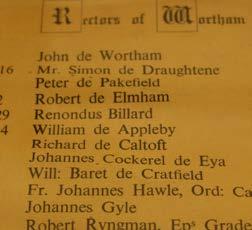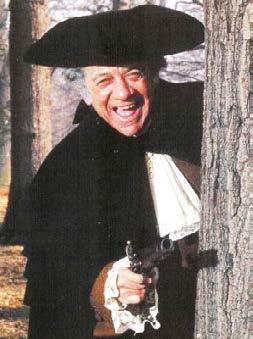
5 minute read
Stand and deliver!
Martin Chambers looks into Suffolk’s dark past at some of the county’s ill-famed bandits and notorious robbers
Highwaymen in this country always seem to be depicted as romantic heroes in literature and film. Throughout English history, from Robin Hood (not your stereotypical highwayman I’ll admit) to Dick Turpin, the
Advertisement
English have had a soft spot in their hearts for these vagabonds and outlaws.
It may be an underdog thing; someone avenging an injustice by robbing those of the class who created the injustice; some poor person desperately trying to make a living after suffering personal setbacks; perhaps even trying to redistribute wealth.
Suffolk has had its fair share. From a priest who went on a robbing rampage, to a visit from Turpin himself, there have been a few galloping over the heaths and highways of our fair county, although it has to be said that most went for the richer pickings of London and its surrounds, rather than bother the good burghers and landowners of this area.
But let us go back in time. Let our minds drift back on the astral plane to the beginning of the fifteenth century. Henry IV is on the throne, Agincourt is but 24 years hence, and the Wars of the Roses are still a half a century away.
Step up one William Baret de Cratfield, inducted as rector at St Mary the Virgin Church in Wortham on July 12, 1401. Whether he was incompetent, or just different, or took umbrage at his flock mocking his French name, he was not the best-loved person in the village by a country mile.
He did not settle well, to say the least, and his parishioners complained about his performance and disregard for proper forms of worship. The complaints reached such a crescendo that the church hierarchy had to take action and Cratfield was forced to resign. On the day he left the village, the locals held a party and lit a bonfire Guy Fawkes-style with the effigy of a clergyman on top.

Above – William Baret de Cratfield is still on the list of rectors at St Mary the Virgin Church in Wortham, and, top, Sid James as Dick Turpin in Carry on Dick
What happened to the rector? He took to the heaths around Newmarket and embarked upon a new career in ‘purse loosening solutions’.
While he lived three centuries before Dick Turpin, he could have been the leading character in the Carry on Dick film, where Sid James plays both Turpin and The Reverend Flasher, such was his dramatic turn of trades.
He then fell in with a rogue called Thomas Tapyrestone, also known as Tepytrone, a failed hosier from London.
For nine years they engaged in a career of robbing travellers on Newmarket heath and extorted cash from other criminals before moving to London in pursuit of better returns.
During his time in the capital he robbed a goldsmith in Farringdon who was able to give a description that led to his identification. He eluded arrest for two more years before being made an outlaw.
He escaped to the safer haunts of Newmarket with Tapyrestone and all was going well until Cratfield fell in love with a young lady. His accomplice, feeling left out, made his farewells and was soon caught. Cratfield was then also caught along with his lady, after refusing to leave her behind, and both were conveyed to Newgate where he was ultimately executed.
While we are not sure where Cratfield came from, the next highwaymen were all Ipswich born.
Thomas Wynne was a notorious criminal in the reign of Queen Elizabeth I. He stayed in Ipswich until 15 or 16 before going to sea. When he came to London nine years later, among many other crimes, he robbed the royal lodgings of Whitehall Palace of plate worth £400, a tidy sum these days, as they say. While he was caught and given clemency – robbery and theft were not deemed as heinous as murder in those days – he soon returned to his old ways. He did commit murder during one of his robberies before heading to the American colony of Virginia. When he returned to England, he accidentally confessed to the earlier murder and was executed at Newgate prison in London.
Thomas Rumbold, also born in Ipswich, robbed the Archbishop of Canterbury. In his youth he was apprenticed to a bricklayer in Ipswich, but quit his trade and was soon on the road to London getting together with a gang of robbers before striking out on his own as a solo highwayman.
After a varied career in and around the capital, with several narrow escapes, he was finally caught, tried condemned and executed at Tyburn in 1689.
The most notorious of the Suffolk highwaymen was Daniel Malden, pictured, whose exploits were well documented at the time. Born in Ipswich in 1712 ‘of honest parents who gave him a good education’ according to testimony, Malden was apprenticed to a sailmaker, a Mr Scarlet at Lynn for a year and a half before leaving him to go to sea. He spent the next six years on various navy and merchant ships before returning to England. He had been engaged as a jockey, primarily at Newmarket, but riding also at Bury and Bungay.
Soon he was on ‘Britain’s most wanted’ list as he, like his Ipswich predecessors, got entangled in a web of crime.
His story is fascinating in that not only did he befriend Dick Turpin, the most notorious of England’s dastardly saddled-up thieving crew, but when caught as most highwaymen were, he escaped twice from prison. Newgate prison in London was no place for softies, so Malden’s escape acts were no mean feats. After his second sortie he fled to Yarmouth and set sail to Holland. Here he met up with Turpin, also on the run, who tried to persuade Malden to sign up for some mercenary action in Europe.
Malden declined, returned to England and was caught once more plying his trade in London. The young man was executed at Newgate.
The most infamous highwayman of them all, Turpin was not Suffolk born, but came from Chelmsford in Essex, and after small beginnings as a poacher of game in Waltham Forest he moved on to bigger things.
He did make his mark in Suffolk though. With his new found accomplice Matthew King he rode into the county as far as Bungay. There the two robbers saw two young women receive fourteen pounds for corn, at which point Turpin resolved to rob them of the money. King objected, saying it was a pity to rob such pretty girls, but Turpin overruled his fellow criminal, and went on to blag the booty.
His many booty calls led to his inevitable execution by hanging.


